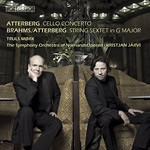
Atterberg: Cello Concerto (with Brahms - String Sextet)
 $35.00
Out of Stock
$35.00
Out of Stock6+ weeks add to cart
KURT ATTERBERG
Atterberg: Cello Concerto (with Brahms - String Sextet)
Truls Mork (cello) / The Symphony Orchestra of NorrlandsOperan / Kristjan Jarvi
[ BIS / CD ]
Release Date: Thursday 1 March 2007
This item is currently out of stock. It may take 6 or more weeks to obtain from when you place your order as this is a specialist product.
Gramophone Magazine - Top 250 Classical recordings of all-time
Atterberg's Cello Concerto had a long gestation but was eventually premiered in 1923 in Berlin. The soloist, Hans Bottermund, who was prominent in the city and who made some 78s, had decided to compose his own cadenza which, according to the astonished composer who was conducting, was "hideously long." At the premiere the cadenza was again unveiled and the concerto relatively well received. Another German performance was given before Atterberg, doubtless exasperated by Bottermund's liberties, bought a new cello - he was a good player - and played it himself at the Swedish premiere in March.
The Concerto is late Romantic in orientation with a hankering for a vein of melancholy nobility. It's cast in three conventional sized and organised movements and cleaves close to expected channels of expression. There are some heroic brass calls in the opening andante cantabile section of the first movement and also a sense of powerful sweep from around 4:15. The ensuing attaca is skittish and takes the cello high - Bottermund and indeed Atterberg himself must have had (or desired to have) a fine sense of pitching at such Alpine heights. Contrasts of high-lying and guttural colours enliven the movement still further. The yearning lyricism of the central movement almost prefigures Finzi and especially touching is the way the solo cello muses and entwines around the horn melody - a reflection of Atterberg's ear for decorative melodic strands but more importantly for gauging the emotional temper of passages. His forte is always tristesse. There are pensive Bachian moments in the finale, with a sideways look at the way in which Dvořák lightened orchestration and gave prominence to wind lines. The sense of introspection however is evident even here, as is the sense that for Atterberg directness and clarity of orchestration are paramount. Mørk needless to say suffers no intonational battles in his command of the work's technical problems. His tone retains allure at all moments and he is adeptly supported by the fifty-strong orchestra whose small complement is in no sense a liability under Kristjan Järvi.
In 1939 Atterberg decided to publish his string orchestra arrangement of Brahms's String Sextet in G major. In his interesting sleeve note Tomas Block suggests that the composer may have been spurred to arrange the sextet after having written a number of polemical essays. But he was in any case concurrently working on his opera Aladdin so maybe it cleansed the compositional palette as well. The arrangement conforms in its own way to everything we know of Atterberg - clear, clean, and responding most warmly to traditional models. Textures therefore remain light and avoid any sense of clogging.
As I've noted the playing is excellent and BIS's recording very much up to its accustomed standard. The sextet arrangement sheds little real light on Atterberg beyond confirming much that we knew and the prize here is the concerto. It's not a CD premiere because Werner Thomas-Mifune has recorded it for Koch-Schwann 315852, a disc I've not heard. For Atterberg admirers though this new disc packs a sizeable and sizeably sensitive punch.
(Musicweb)
Tracks:
Kurt Atterberg:
Concerto for Cello and Orchestra, Op.21.
Johannes Brahms:
String Sextet No.2 in G major, Op.36
(arranged for string orchestra by Kurt Atterberg)